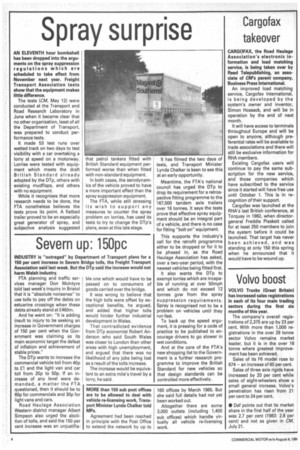Spray surprise
Page 6

If you've noticed an error in this article please click here to report it so we can fix it.
AN ELEVENTH hour bombshell has been dropped into the arguments on the spray suppression regulations which are scheduled to take effect from November next year. Freight Transport Association tests show that the equipment makes little difference.
The tests (CM, May 12) were conducted at the Transport and Road Research Laboratory in June when it became clear that no other organisation, least of all the Department of Transport, was prepared to conduct performance tests.
It made 53 test runs over wetted track on two days to test visibility with a car overtaking a lorry at speed on a motorway. Lorries were tested with equipment which meets the draft British Standard already adopted by the DTp, others with existing mudflaps, and others with no equipment.
While it recognises that more research needs to be done, the ETA nonetheless believes the tests prove its point. A flatbed trailer proved to be an especially great generator of spray, and subjective analysis suggested that petrol tankers fitted with British Standard equipment performed worse than when fitted with non-standard equipment.
in both cases, the aerodynamics of the vehicle proved to have a more important effect than the spray suppression equipment.
The ETA, while still stressing its wish to support any measures to counter the spray problem on lorries, has used its tests to try to change the DTp's plans, even at this late stage. It has filmed the two days of tests, and Transport Minister Lynda Chalker is keen to see this at an early opportunity.
Meantime, the ETA's national council has urged the DTp to drop its requirement for a retrospective fitting programme to the 167,000 tandem axle trailers over 16 tonnes. It says the tests prove that effective spray equipment should be an integral part of a vehicle, and there is no case for fitting "bolt on" equipment.
This supports the industry's call for the retrofit programme either to be dropped or for it to be phased in, as the Road Haulage Association has asked, over a two-year period, with the newest vehicles being fitted first.
It also wants the DTp to exempt lorries which are incapable of running at over 50mph and which do not exceed 12 tonnes gvw from the spray suppression requirements. Spray is recognised not to be a problem on vehicles until they run fast.
To back up the speed argument, it is pressing for a code of practice to be published to encourage drivers to go slower in wet conditions.
And at the core of the PTA's new shopping list to the Government is a further research programme to improve the British Standard for new vehicles so that design standards can be controlled more effectively.
160 offices by March 1985. But she said full details had not yet been worked out.
Altogether there are some 3,000 outlets (including 1,400 sub offices) which handle virtually all vehicle re-licensing work.
























































































